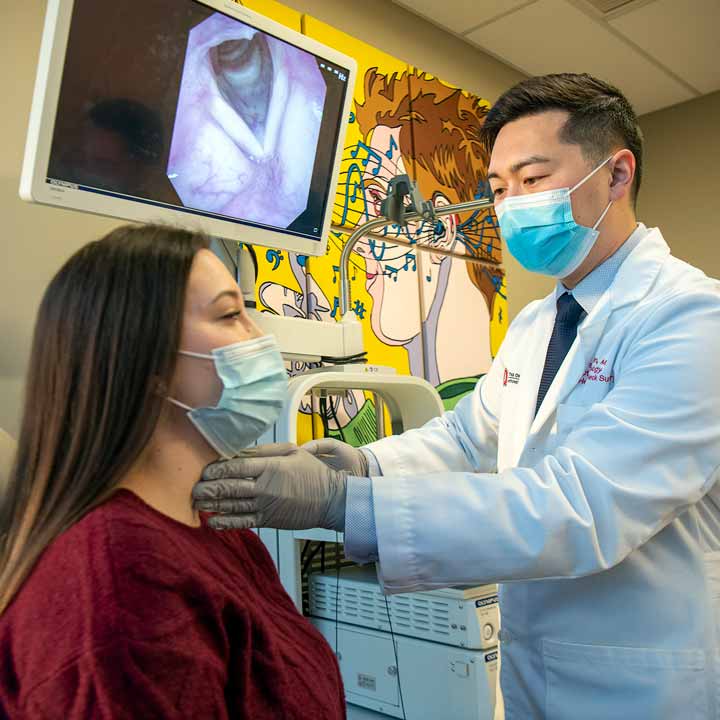 Your voice is one of your most powerful assets, so when it doesn’t function properly or sounds different it can have a profound impact on your daily living. This is especially true for someone who uses their voice often for work, like a teacher, restaurant server or professional singer.
Your voice is one of your most powerful assets, so when it doesn’t function properly or sounds different it can have a profound impact on your daily living. This is especially true for someone who uses their voice often for work, like a teacher, restaurant server or professional singer.
Laryngitis is one of the most common voice disorders that can affect the way you talk or communicate.
At The Ohio State University Wexner Medical Center in Columbus, Ohio, we recognize how important everyone’s voice is, which is why we have a dedicated team of laryngology specialists. This team includes five fellowship-trained laryngologists, who can handle the most difficult aspects of voice, airway and swallowing disorders.
We have one of the largest Voice and Swallowing programs in the country, so we’ll be able to get you back to talking, laughing and singing in your best voice in no time if you’re suffering from laryngitis.
What is laryngitis?
Laryngitis is a very common voice condition. Most adults will experience acute laryngitis at least a few times in their lives. Roughly 20% of adults will develop chronic laryngitis lasting longer than three weeks.
When laryngitis strikes, your voice changes or you lose your voice completely. Your voice becomes hoarse, weak or, in some cases, unrecognizable.
This happens because your larynx, or voice box, becomes inflamed.
Normally, the two vocal cords inside the larynx open and close as well as vibrate smoothly to produce sound; however, when the vocal cords are swollen, the sounds change or become distorted.
Causes of laryngitis
The voice box becomes inflamed for three main reasons: infection, irritation or overuse. If your laryngitis is caused by a viral or bacterial infection, it can be contagious, meaning you can pass it on to others.
Other causes of laryngitis include:
- Straining or overuse of voice
- Poor vocal hygiene, including dehydration
- Smoking or vaping
- Heavy drinking
- Irritants, such as gastroesophageal reflux or sinus issues
- Inhalation of certain medications
- Certain autoimmune disorders, like Wegener’s disease or pemphigus
- Sore or dry throat and cough
Laryngitis is generally acute, meaning it goes away in a few days or weeks, if it’s caused by an infection or temporary vocal strain from yelling or singing loudly. It can be longer-term or chronic if caused by smoking, drinking alcohol, an allergic reaction or persistent overuse.
Laryngitis symptoms
The hallmark symptom of laryngitis is a change in voice due to the swollen vocal cords. Other symptoms include:
- Hoarseness
- Loss of voice or difficulty speaking
- Dry cough
- Itchy or sore throat
- Mild fever
Laryngitis treatment
Most of the time laryngitis can be treated with a few, simple at-home remedies. Sometimes lifestyle changes are necessary to help manage chronic versions of the condition.
Ways you can treat laryngitis yourself include:
- Rest your voice as much as possible
- Don’t whisper as that puts more strain on vocal cords
- Drink plenty of fluids
- Use a humidifier
- Take pain relievers for soreness
- Avoid irritants, such as smoking or alcohol
If your laryngitis symptoms last longer than two weeks, you should see a doctor. Here at the Ohio State Wexner Medical Center, we have a variety of ways we can treat laryngitis when it isn’t getting better with self-care methods.
Our voice experts treat laryngitis with:
- Antibiotics, if it’s caused by an infection
- Corticosteroids
- Treatments for underlying causes, such as sinus issues or reflux disease
- Voice therapy to improve care of voice
- Laryngology surgery
It’s important to work with a voice and swallowing specialist to treat your laryngitis, because the condition can lead to complications, such as nodules and polyps that make it difficult to speak or sing, and can become cancerous over time.
Additional Information
How would you like to schedule?
Don’t have MyChart? Create an account
